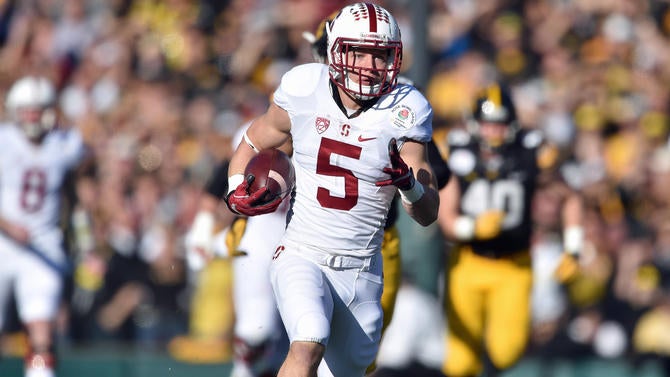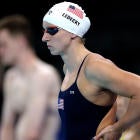Apologies in advance, but we're going to bring your worst nightmare to life. Warning: This is some Freddy Krueger/Jason Voorhees stuff.
Or clowns. Maybe it's clowns for you.
Imagine for a moment what would happen to Stanford if, say, Christian McCaffrey sustained (heaven forbid) a season-ending injury in Week 1. If you're a Cardinal fan, the thought of navigating through the season without college football's best utility player is enough to wake you up in a cold sweat.
What if something similar happened to LSU running back Leonard Fournette? Or Ohio State quarterback J.T. Barrett?
OK, we'll stop. You get the point.

With the 2016 season just a few months away now, we've compiled a list of the 16 most irreplaceable players in college football. Keep in mind this is not a list of the best players. Rather, these are the foundation players -- the ones that, if removed from the field, would greatly affect their team's success. This means other factors come into play as well, like depth, experience and talent behind the listed starters.
With all of those things in mind, check out this year's most irreplaceable players list and let us know what you think, as we're sure you'll agree wholeheartedly.
16. Michigan RB De'Veon Smith: Smith was an underrated part of Michigan's offense in 2015. He's a quintessential Jim Harbaugh running back through and through. Smith isn't the most explosive back, but he's excellent at breaking tackles and getting tough yards. When you're rebuilding an offensive line like the Wolverines were last year, a player like Smith is valuable. Smith had roughly three times as many carries and yards per game as the next-leading rusher (Drake Johnson, 54 touches, 22.58 yards per game).
15. Pitt QB Nathan Peterman: Peterman isn't the trendiest name here, but hear us out. Pitt's offense obviously goes through its ground game, but Peterman has the capability of stretching the ball downfield in the passing attack. No other quarterback not named Chad Voytik threw a pass for Pitt in 2015, and Voytik has transferred to Arkansas State. Pitt has already shown it can run the ball without James Conner -- Qadree Ollison rushed for more than 1,100 yards and 11 touchdowns -- but the Panthers could be in real trouble if Peterman ever leaves the field. This is especially true if you're of the belief Pitt could be a sleeper ACC Coastal contender.
14. Oregon QB Dakota Prukop: Normally, we'd normally exclude someone who hasn't taken a snap for his team yet. However, the Oregon quarterback situation is, to put it one way, less than ideal. There was a notable difference in the offense last year between when Vernon Adams Jr. and Jeff Lockie played. Adams was the most efficient passer in the FBS (179 passer rating), while Lockie struggled in appearances against Utah, Washington State and TCU.
13. Texas LB Malik Jefferson: It remains to be seen if third-year coach Charlie Strong will get things done at Texas. We know this much, though: He's a defensive guy at heart and Jefferson is the type of program-changing player Strong can build things around. The Longhorns' defense was historically bad in 2015, but Jefferson had 61 tackles in 11 games. More importantly, he can play a variety of positions and offer versatile looks to that defense.
12. Maryland CB William Likely: How many wins is Likely's on-field presence worth? It's hard to tell. For one, Likely doesn't play a position that touches the ball every snap (i.e. quarterback). Secondly, cornerback is a position rooted in eliminating production, not creating it. Likely doesn't have great (or even good) size, but he is the Terps' most experienced and talented player in the secondary. He led the nation with 38.1 punt return yards per game and had 233 return yards alone against Richmond. He's even dabbled in some rushing and receiving for Maryland's offense. He isn't as productive as McCaffrey, but he is extremely important to Maryland.
11. Western Michigan WR Corey Davis: If you missed Western Michigan at all last year, shame on you. (Sorry, that was harsh, but please do watch the to get your Group of Five and #MACtion fix.) The Broncos had a potent wide receiver combo with Davis and Daniel Braverman. But with Braverman off to the NFL, it's now Davis' job to be the guy for Western Michigan's passing attack. Davis is a bigger body than Braverman at 6-foot-3 and 213 pounds, making him a tough matchup on the outside. Last season, Davis caught 90 passes for a team-best 1,436 yards.
10. Alabama WR Calvin Ridley: Ridley isn't a hog when it comes to production. He's not Tyler Boyd or Tyler Lockett -- guys who will account for anywhere from one-third to one-half of their offense's receiving stats. In that way, he's different from a lot of guys on this list. However, Ridley is that perfect piece for offensive coordinator Lane Kiffin. Just when you think you have to stop the Tide's powerful running game, Kiffin will call up a play action to hit Ridley deep. Or when you stack the box, Alabama will hit Ridley with a screen and let him gobble up yards after the catch. He's the guy that busts the defense wide open. Kiffin loves that type of explosive playmaker.
9. San Diego State RB Donnel Pumphrey: San Diego State had a nice one-two combo in the backfield with Pumphrey and Chase Price. However, Price graduated, leaving Pumphrey as the most productive of the Aztecs' returning backs. The next-leading rusher, Rashaad Penny, had 368 yards on the ground. Pumphrey had 1,653. San Diego State ran the ball nearly 73 percent of the time in 2015. Suffice to say, Pumphrey is important to the Aztecs' rushing attack.
8. USC CB Adoree' Jackson: By now, you're likely noticing a common thread of two-way/utility players. That's not by mistake. With linebacker Su'a Cravens gone, Jackson is the best player on USC's defense. Jackson also happens to be an electrifying return man (two punts return for touchdowns in 2015) and the second-leading receiver on offense. His future is at corner because of his closing speed and hips, but the Trojans know what they have and aren't afraid to use him in as many ways possible. Without Jackson, USC loses a top defender and offensive/special teams weapon, and wouldn't be nearly as explosive.
7. Iowa CB Desmond King: Where do you want to begin with King? He was a unanimous All-American and the Jim Thorpe Award winner. He tied for second in the FBS with eight interceptions and was the cornerstone of a Hawkeyes defense that led the Big Ten in picks. His return at least gives Iowa a chance to repeat as Big Ten West champs. Heading into next year's draft, King figures to be one of the top defensive backs available with room to climb up the big board. As for his senior year, his presence alone could take away an entire half of the field for opposing offenses.
6. Houston QB Greg Ward Jr.: You already know Houston is going to be the Group of Five team/playoff crasher du jour in 2016. The player who can lead them there is Ward. Don't worry about his lack of size or the fact that he doesn't play in a pro-style offense. Just sit back and watch him play. He's exciting and will make more than a few defenders look silly. As for his value? Let's put it this way: Did you watch Houston lose to UConn (basically) without Ward's services? There you go.
5. Ohio State QB J.T. Barrett: The funny thing is, we already kind of saw Ohio State try to replace Barrett with Cardale Jones in 2015. While Ohio State didn't start losing games left and right with Jones as "1A" starter, if you will, something was clearly off about the Buckeyes' offense. Barrett simply fit better and his role as a red-zone weapon eventually expanded to full-time starter again. With Jones and Braxton Miller gone, this is Barrett's team. Ohio State is already replacing a lot of key starters, further cementing Barrett's role as the team's leader. Lose him and the Buckeyes could be in serious trouble.
4. LSU RB Leonard Fournette: With the way LSU runs the ball, I'd sooner have confidence in its ability to replace Fournette than, say, quarterback Brandon Harris. That said, Fournette accounted for 60 percent of LSU's rushes last season. He's a freak of nature and does things few other running backs can. He's big, powerful and fast with excellent vision. He's everything you want in an every-down back. Those types of players don't just walk through the door, even at a place like LSU.
3. Clemson QB Deshaun Watson: We saw what happened when Watson went down with an injury two years ago. Clemson's offense simply wasn't the same with Cole Stoudt (though Stoudt did have a memorable performance against Oklahoma in the Russell Athletic Bowl). What would Clemson's offense, potentially the best in the country, look like now if its star quarterback went down? Nick Schuessler has limited game action and he doesn't possess the arm, decision-making or mobility Watson has. The Tigers may need to win with offense in 2016 and Watson is crucial to that mission.
2. Oklahoma QB Baker Mayfield: We could dive into the fact that Oklahoma doesn't have an experienced quarterback behind Mayfield. (Cody Thomas switched to baseball full-time and Texas A&M transfer Kyler Murray isn't eligible until 2017.) We could mention that Oklahoma is the likely preseason Big 12 favorite looking to get back to the playoff. Really, though, Mayfield gets this much consideration because of what he brings to the Sooners offense. He's a the classic head-on-a-swivel gunslinger. He plays with an enormous amount of confidence with athleticism to boot. He's not the most physically overpowering player, but he elevates guys around him. That's tough to replace.
1. Stanford RB Christian McCaffrey: Who else would it be? McCaffrey may not have been college football's single best running back ... or receiver ... but he was the sport's most versatile weapon. He led the FBS by a country mile with 276 all-purpose yards per game and broke the NCAA single-season record for all-purpose yards (3,864). He's fast and agile but still has a place in Stanford's power running game. He's a tremendous receiver out of the backfield and a lethal return man. There's nobody in the game today who does more -- or does it as well -- than McCaffrey.
















